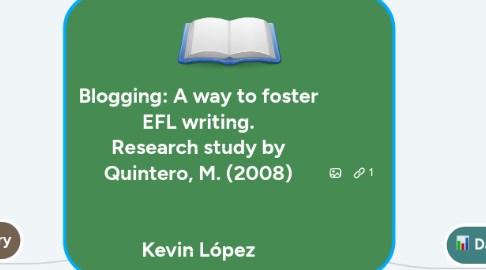
1. Introduction
1.1. Difficult task
1.1.1. syntax and lexis
1.1.2. Mental processes
1.2. Little attention
1.2.1. j
1.2.1.1. j
1.3. Focus
1.3.1. More on form
1.3.2. Little on meaning
1.4. poor feedback
2. Underlying theory
2.1. conceptions to writing
2.1.1. implications
2.1.1.1. beyond organizing structures
2.1.1.2. meaning creation
2.1.2. perspectives
2.1.2.1. writing as product
2.1.2.1.1. linear approach
2.1.2.1.2. resulting perfect structures
2.1.2.2. writing as process
2.1.2.2.1. process approach
2.1.2.2.2. writing-revising-rewriting activity
2.2. considerations on feedback
2.2.1. teacher's role
2.2.1.1. marking judge
2.2.1.2. coaching mediator
2.2.1.2.1. authentic reader responses
2.2.2. peers' role
2.2.2.1. informal alternative to teacher's authority
2.2.3. dual attention focus
2.2.3.1. content
2.2.3.1.1. encourage free expression
2.2.3.2. form
2.3. technology contributions
2.3.1. intercultural competence increasement
2.3.2. a different audience to write to
2.3.3. motivation enhancer
2.3.3.1. interacting about students' likes and beliefs
2.3.4. blogging
2.3.4.1. promotes authentic communication
2.3.4.2. allows for self-expression
2.4. communities of practice
2.4.1. Vigotsky's ideas
2.4.2. sharing common interests
3. Research design
3.1. Action Research
3.1.1. confrontation of identified classroom problems
3.1.2. change teaching practices as solutions
3.2. Research questions
3.2.1. What insights about writing in EFL can we gain from a blog writing experience?
3.2.2. How does feedback provided in the blog writing experience shape Colombian students’ writing in EFL?
3.3. setting
3.3.1. 17 Colombian students of B.A. in primary education with emphasis on ELT from Universidad Distrital Francisco José de Caldas
3.3.2. Canadian students as peers of interaction
3.4. Instruments
3.4.1. Interviews
3.4.2. Students' artifacts
3.4.3. Students' blogs
4. Data analysis and findings
4.1. Community of writers
4.1.1. Colombian and Canadian learners
4.1.1.1. shared learning practice
4.1.1.2. shared similar interests
4.1.1.3. communication interest building
4.1.1.4. writing to a real audience/reader
4.1.1.5. peer's feedback and negotiation through sociocultural topics
4.1.1.5.1. implicit and explicit
4.2. Blog writing: Portraying students selves
4.2.1. freedom
4.2.1.1. to choose the topics
4.2.1.1.1. motivation to discuss
4.2.1.2. to self-express
4.2.1.2.1. engagement in writing about themselves
4.3. Providing feedback: Coaching the process
4.3.1. teacher researcher roles
4.3.1.1. helper in students' writing development
4.3.1.1.1. ZPD emergence
4.3.1.2. facilitator of interactions
4.3.1.3. coach instead of judge
5. Conclusions
5.1. important insights to writing in EFL
5.1.1. need of communities of practice
5.1.1.1. writing desire
5.1.1.2. Vigotsky's principles
5.1.2. creation of technological writing environments
5.1.2.1. students' voices heard
5.1.3. essential feedback
5.1.3.1. teachers
5.1.3.1.1. writing development assistance
5.1.3.2. peers
5.1.3.2.1. contribution for scaffolding role
